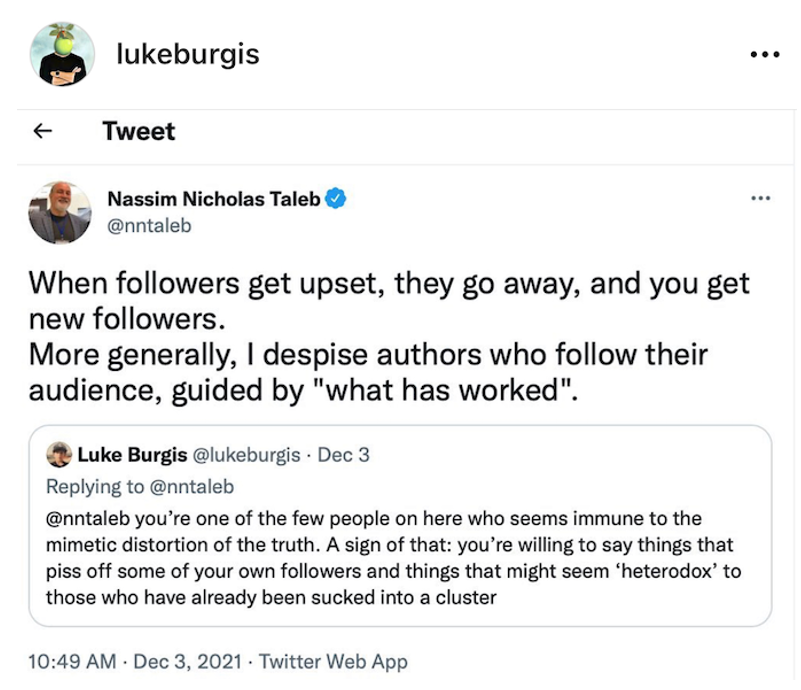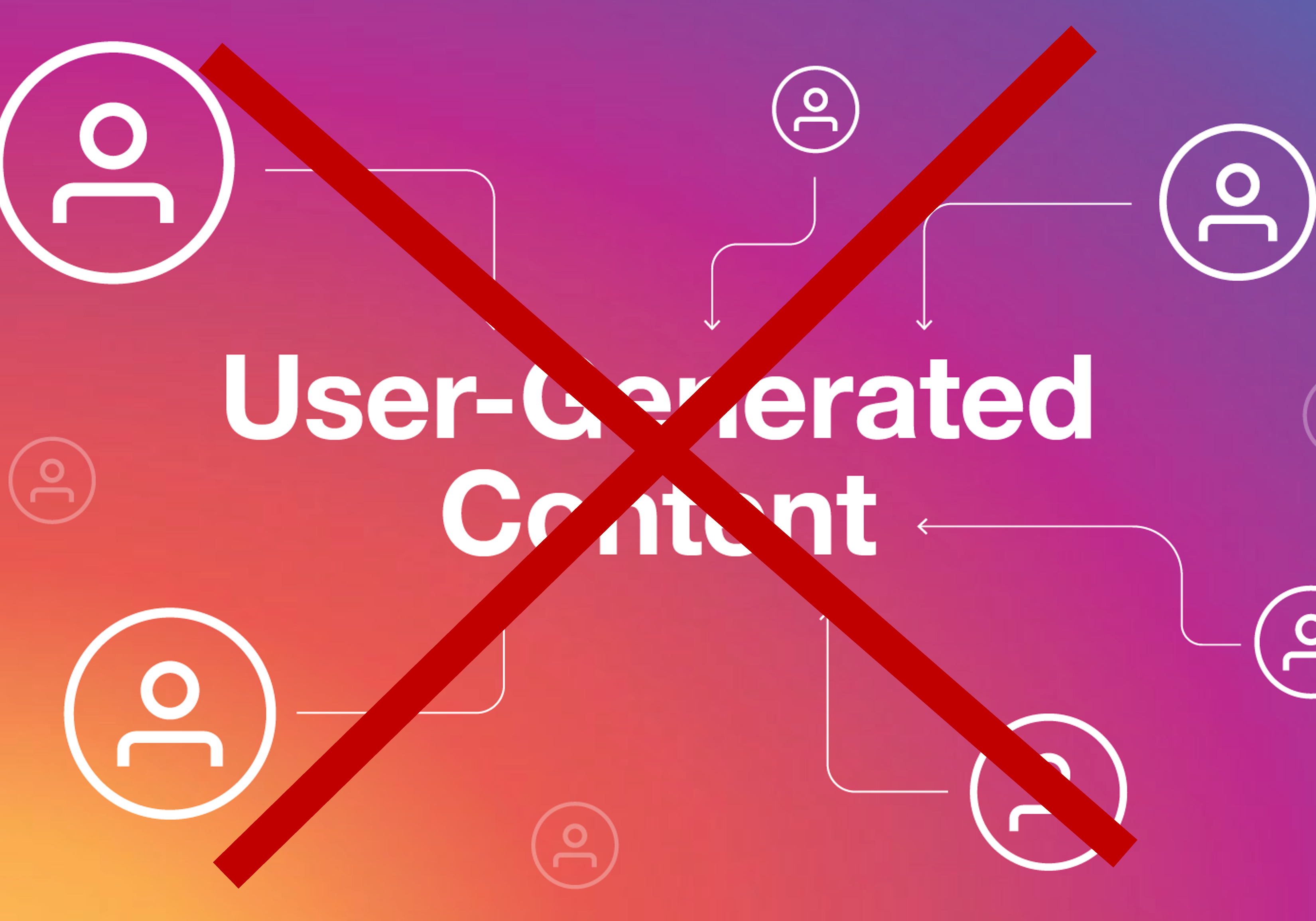Luke Burgis wrote a book that I think is really good. It’s called Wanting: The Power of Mimetic Desire in Everyday Life, and we recorded a podcast to talk about it. Luke has graciously agreed to contribute an occasional essay to Epsilon Theory, and there’s lots more great stuff where this came from on Luke’s substack: Anti-Mimetic.
As with all of our guest contributors, Luke’s post may not represent the views of Epsilon Theory or Second Foundation Partners, and should not be construed as advice to purchase or sell any security.

The social rewards that come from imitating others feel good, but they come at a high price.
Sometimes going with the flow is nice. Nobody wants to be the disagreeable, anti-mimetic guy in a group that makes it impossible to gain consensus among a group of friends about where to grab a beer or a bite to eat. And I consider it a positive thing to be infected by the calm, even lazy, disposition of a non-workaholic friend if that helps you chill on Sunday and make good on the day of rest.
The word ‘mimetic’ was coined by the French social theorist René Girard. It is related to the word ‘mimic’—the human propensity to mimic what the people around them are doing. But Girard’s finding went deeper: it’s not only what they do, but what they want that we also mimic. We adopt their desires as our own, unconsciously—and then convince ourselves that our desires are entirely our own. He called this mimetic desire, and I’ve written about it extensively in my book Wanting.
Below are some of the ways that we might cultivate some ‘anti-mimetic’ habits so that we’re not constantly struggling to keep up in the hamster wheel of desire that most of the people around us are running on—and reinforcing the wheel for one another. I hope some of these tactics will help you step off and chart your own course a bit more easily.
As nice as it is to ‘fit in’, there are other times when it’s necessary to exercise self-possession, freedom, and intentionality to choose a course of action that isn’t quite so mimetic — that is not primarily the product of social imitation but the product of our innermost sanctum: our conscience, our understanding of our vocation, our deliberate and fully ‘owned’ choice of what we believe to be true, good, and beautiful. It is through these kind of intentional acts that we become who we are.
Being “anti-mimetic” does not mean being a ‘contrarian’ or refusing to imitate one’s peers. That’s what every hipster thinks he’s doing, too. “Everyone leaves the beaten path only to fall into the same ditch,” wrote the social theorist René Girard, the father of mimetic theory. This kind of naive rejection of the culture is not what we’re talking about here.
Being anti-mimetic means have the personal freedom to counteract negative forms of mimetic desire — like the kind that leads to polarized politics, unhealthy obsessions, envy, hustle-porn, and never-satisfied striving for things that won’t ultimately matter to impress people who don’t love us.
Being anti-mimetic is the power to live in freedom. An anti-mimetic action or person is a sign of contradiction to a culture that likes to float downstream.
You know the kind of fish that floats downstream? A dead one.
I want to be the kind of person that can swim upstream when needed. That’s not an ability that any of us should take for granted.
Before we get to the 25 ideas, one interesting note: the word “anti-mimesis” has been used to refer to an artistic philosophy, with Oscar Wilde as its most famous advocate. He meant ‘anti-mimetic’ in a slightly different way that I mean it here. Wilde was referring to art and making the point that art is not what is ‘mimetic’—art doesn’t imitate life. Art is anti-mimetic, in fact. It’s we humans that are the mimetic ones. We imitate art.

In his 1891 book The Decay of Lying (‘decay’ is translated ‘decadencia’ in the Spanish edition…), he articulates this anti-mimetic vision of the artist. The artist is a creator par excellence. The artist brings new realities into being and changes how we see and experience the world.
Wilde believes that lying—“the telling of beautiful untrue things”—is the proper aim of art. It’s “an art, a science, and a social pleasure,” and its decay is responsible for the decay of literature. Today everyone is obsessed with representing reality as accurately as possible — with facts and accuracy. But “if something cannot be done to check, or at least to modify, our monstrous worship of facts,” he writes, “Art will become sterile and beauty will pass away from the land.”
The artist endows things with beauty and is the reason why attention is paid to some things in the first place. Wilde writes about the fog in London as an example. It has always existed. But its wonder and the attention paid to it happened because “poets and painters have taught the loveliness of such effects…They did not exist till Art had invented them.”
The older I get, the more I realize that most of life is a matter of what we pay attention to — of what we attend to, with focus.
There are many different ways to attend to reality; most of us spend our lives stuck attending to it in only one or two modes. Part of the purpose of Wilde’s work, and I hope my own, is to propose some new ones.
Let’s start with 25 Anti-Mimetic ideas that can help us craft a life that is a little more free from the mimetic herd; a bit more open to the spontaneity and wonder of new things (including new desires); and a free life that saves us — in the words of G.K. Chesterton — from ‘the degrading slavery of becoming a child of our age.’
Alright: here they are, in no real particular order (well, except for the last few — which I think are the most important).
These are all things I’ve tried to cultivate in my own life…to greater and lesser degrees of success. I’ve kept the descriptions intentionally brief because each one of these could become an essay unto itself in the coming year. I hope this begins a conversation.
The Top 25 Practical Ideas for Becoming More Anti-Mimetic in Everyday Life
25. Anti-Mimetic Scheduling
Why go to the gym at 5:30pm on a weekend? Okay, maybe you just got off of work and it’s the only time you can. Or why make a dinner reservation at 7pm on a Friday night? There might be an excellent reason: it’s fun to be in a buzzing place sometimes — and it’s a great way to end the workweek. There are perfectly good reasons to schedule things around the same time that other people do; after all, there’s a reason why these are ‘peak’ times in the first place. At the same time, there are many idiotic reasons. I am amazed at how many entrepreneurs are stuck in the 9–5 / Mon-Fri mentality inherited from the standard work week. It’s ingrained. Each of us has the power, though, to make our experiences a bit less stressful and more enjoyable if we take advantage of the off-peak times when we have the freedom to do things on our own time. Some of my favorites include: going to the bar of a restaurant between 2–5pm when I’m the only person in the place and knocking out some work over an appetizer; going to museums (I live in DC, so there are a ton of great ones) during weekday mornings; and golfing at twilight where the rates are cheaper and there are 80% less people on the course (I also happen to think it’s the most beautiful time of the day to golf, anyway. I’ve had many quiet and inspiring moment losing my ball in the setting sun.) What are your some yours? Please use the comments section to share, if you’d like.
24. Building a Deep Bookshelf
I read many books not because I think I’ll ‘like’ them but because I think that I won’t. And that is exactly the point. I call these anti-mimetic book choices part of my ‘deep’ bookshelf because they go beyond the facade of easy choices presented to us on ‘lists’ or by the algorithm. My challenge: allocate 10% of your annual reading to books where you know you’re not going to ‘agree’ with the fundamental premise. This goes for periodicals, too.
23. Don’t Participate in the Shark-Tankification of Worth
I have always had disdain for the show Shark Tank and all of its many derivatives. The value assigned to founders and companies is more of a product of theater and mimesis than serious investigation and investment — and the spirit that drives people to want to compete in these dog-and-pony shows in the first place has to do with mimetic validation. This is not the way great companies are built. Needing this kind of recognition will eventually break you. In my experience, ‘business plan competitions’ and ‘incubators’ function like beauty contests, and they attract entrepreneurs who self-select based on emotional needs. The sooner you kill this beast within yourself, the sooner you can get to the real work of creating something that the market itself will validate — or not.
22. Learn to Navigate without GPS
What’s wrong with the fastest route from A to B? It kills the brain and it kills the wandering — the spirit. Not all who wander are lost. And sometimes, I like to drive with absolutely no destination at all. Why We Drive by Matthew B. Crawford helps explain some of the reasons why. This is anti-mimetic in the sense that it makes a mockery of our world’s obsession with efficiency. Here’s Anthony Bourdain on the topic: the joy is in finding “this little out-of-way place, that discovery is often the result of a happy mishap or an accident. You know, car breaks down, you get lost, you end up at some grotty little place that ends up being magical.” It would never happen if we stayed locked into the mimetic grooves of maps and travel books.
21. Watch stellar old films that never benefited from mimetically-inflated popularity
My friend Thomas J. Bevan is on a mission to dig up older, forgotten films that nobody else has thought to review recently — too distracted by the shiny red ball of the next Netflix show as they are. I have enjoyed his reviews immensely because he is intentionally going in search of the anti-mimetic gems and making them accessible and appreciated (and so desirable) for his readers. Here is one of my favorites.

See, doesn’t that make you want to revisit 1947? Tom is doing for films what many people understand about ‘old books’ — there are hundreds of years of stellar, world-changing books, but most people will go their entire lives having read a very small spattering of them while consuming vast amounts of fortune-cookie pseudo-wisdom that sells in the marketplace today. Older films are waiting for us to mine them for pleasure, enjoyment, and new ways of looking at the world. I think it’s NNT who says to never read a book unless it’s over 25 years old. Try applying that to movies for a few months.
20. Read Foreign Newspapers
Foreign newspapers — while they may be mimetic as hell inside their own countries — are outside of the fishbowl that you’re swimming in. In that way, you could even call them ‘transcendent’ publications. They’re not in our crab bucket. This means that their ‘takes’ on the stuff going on in our own country are far more interesting than listening to the latest pundit that is peddled to us on the evening news or in our social media feed. I lived in Italy for a few years and came to love reading about what the Italians had to say about what was going on in the U.S.; it got to a point that I found the U.S. news increasingly one-sided and ridiculous. Today I try to read a smattering of foreign language newspapers (at least the ones that I can understand — and if I don’t, I use google translate). It’s easy to forget that amount of stuff that we are exposed to in the English language is only a fraction of the total available knowledge available in the world.
19. Stop Writing to Please
Writing to please is a recipe for lowest common denominator ideas and quality. If you’re not pissing anyone off from time to time, or getting some quick unsubscribers from your newsletters, then you’re not actively trying to find your audience. As rough around the edges as Taleb can be, I admire his commitment to pissing people off. It could be argued that he ‘can’ do that because he’s already established and wealthy; he doesn’t rely on subscribers/readers for money at this point. Yes, that may be true. He might be more anti-fragile than you and I. But nobody should wait until they’re anti-fragile to act with integrity and speak the truth. That is a fool’s game. It starts today. The cluster-effect is real. The longer you wait to break it, the harder it will be. I don’t sit down and write the next edition of this newsletter after studying which past editions have gotten the most opens and engagement; if I tailored everything after “what has worked in the past” then I’m living in the past, not moving forward into the future. I recently had this discussion with a publisher who was encouraging me to write another book on Girard. There is low-hanging fruit there, sure; but sometimes the higher-hanging fruit is what we need to be nourished.

18. Filter Feedback
This one comes straight out of Wanting, so to those of you who have read the book I won’t belabor the point. But it’s simple: some feedback is good, some feedback is bad. And too much feedback is detrimental — especially to a Creative. At a certain point, you have to choose. If you try to take into account every person’s opinion, you’ll end up with something ‘nice’ — not great. The same is true of ‘market research’ and ‘data’ — people don’t know what they want. Henry Ford said, ‘If I’d asked people what they wanted, they would’ve told me it was a faster horse.’ Here’s Steve Jobs making a similar point:
People don’t know what they want until you show it to them. That’s why I never rely on market research. Our task is to read things that are not yet on the page.
Filter feedback the way you filter calories: take only what you need. Take the rest with a grain of salt.
17. Invest in Deep Silence
Silence is the great mimetic quieter. It’s just that simple. I have a fundamental belief that if everyone in the corporate world had 5–6 days of silence per year, we woudn’t be destroying billions of dollar in value chasing bad ideas — the thin desires would fade away and the thick ones would emerge. People would have a great sense of purpose. The Great Resignation would turn into the Great Embracing of Purpose. It is currently not. I realize that this idea of silence retreats might seem like a pipedream for many individuals (especially those with children) and for corporations — it would require a significant investment. We can start, though, with our families and businesses. “All of humanity’s problems stem from man’s inability to sit quietly in a room alone,” wrote the French philosopher Blaise Pascal. He was right. And the only way we’ll begin to develop that ability is to start trying. This is positive mimesis at its best. I’ll be announcing a major initiative to bring structured silent retreats to more people soon — stay tuned. If you’re an individual or an organization who would be interested in participating in the first one, just drop the team a line here.

16. Set-up an Anti-Mimetic Environment
If you’ve been paying close attention to social media, you could easily believe that Austin or Miami are the only places in the U.S. where you can be a great innovator in these Soaring 20’s. (Or maybe it’s the Metaverse.) I am pumping the brakes hard on embracing these Mimetically Popular Locations. It’s extremely hard to escape the negative forces of mimesis while you’re standing shoulder to shoulder with a bunch of other people who are caught up in it. There has never been a time when there is more wide-open anti-mimetic landscape to explore in the world — and with the ability to work-from-home, that is only accelerating. I have nothing against clustering with people who share your values and lifestyle. It’s true that throughout history people in certain ‘centers’ have benefited tremendously from network effects. But it’s also true that many have had to intentionally separate themselves from the dominant herd and live an existence sufficiently unplugged from the prevalent systems of desire in order to change the world, at least change themselves. I think immediately of the Desert Fathers of the 3rd and 4th centuries around Egypt. What is today’s ‘desert’? When I moved my company from California to Nevada in 2008, I realized that I was literally going into the desert to learn something about myself. And that’s exactly what happened. I went into the desert spiritually, emotionally, and physically; I was transformed by it. The challenge now is re-creating that desert experience in modern life. But we have a duty to try — and each of us can do it our own way.
15. Look for the Coincidence of Opposites
The fifteenth century polymath Nicholas of Cusa coined the term “The Coincidence of Opposites” (the coincidentia oppositorum in Latin). This means that opposites genuinely coincide while remaining distinct. It’s striking that in any case of extreme holiness, the coincidence of opposites is always present. In the person of Christ, for example, there are examples of extreme humility and meakness combined with boldness and zeal in the same person — and it all perfectly coheres. For most of us, we’re one way or the other. But in higher levels of spiritual development, there is no hypocrisy or contradiction between things that we don’t ordinarily think are compatible. These ‘seeming’ opposites coincide in perfect harmony — and it is evidence of a deeper truth. Dwelling in the coincidence of opposites without always defaulting to “convergent” thought is the key. Convergent thought always needs to converge on one solution, one answer, one mode of looking. My friend August Turak, an early executive at MTV, once told me the story of his friend quizzing him by giving him a series of numbers and asking what was the next number in the sequence. 14, 18, 23, 28, 34. He was racking his brain — he prided himself on being able to solve this kind of puzzle. 18–14, 23–18…no. He couldn’t figure it out. Finally, his friend smiled and said “42.” August looked up to see the number 42 emblazoned on the 42nd street subway station from the NYC subway car they were riding in. His mind had ‘converged’ on this being a math problem. But all he needed to do is attend to reality and he would’ve seen the answer.
14. Pay Attention to Real Things
Mimetic desire can live in the abstract. But ‘active love’, as Fr. Zosima describes it in Dostoevsky’s The Brothers Karamazov, breaks through and forces us to attend to reality. Over the past couple of months, I was given the lot of having to watch my mother die as I held her hand in the hospital. I’m an only child, and her only and primary caregiver. In a situation like that, all abstract ideas about desire fade away. I had a feeble hand reaching out to grasp mine, and there was only one thing to do — reach out and take it into mine, and hold it. These are the moments when life becomes incredibly simple. There is a principle here: the more we are attending to the incarnate reality of the world we are living in, the less we are driven all over the place by abstract mimetic desires that are only leading us astray. Escaping the throes of some of our most unhealthy mimetic desires happens when we’re rooted and grounded in the Real. Maybe this is why people like moving to farms lately (yes, I know that’s partly mimetic, too). But when you’re forced to clean up cow shit every morning, you have a lot less time to pay attention to the latest social media influencer. Reality calls. Shit is literally happening.
13. Social Media with a Purpose
How many people can honestly and explicitly articulate their purpose, or mission, on social media? Is it to gain followers? Sell books? Build a Substack list? What? You have to be able to answer the question. If you have a vague answer, dial it in immediately. Otherwise, your purpose there is being dominated by mimesis for you. Your purpose, quite simply, will be what everyone else’s purpose is. Or the purpose of the person or basket of people you pay the most attention to. To take an anti-mimetic approach to social media, either 1) get off it completely; or 2) be guided by a very clear purpose. Even then, you will have to constantly gird yourself against the mimetic winds — but you will at least have a destination to sail in.
12. Start Going Analog
A hard copy of a book is metaphysically different from a digital one. For all of the many benefits of digital and audio books, their primary means of being acquired and read in the first place almost always driven by algorithms — you don’t walk down a hallway in the back of a duty used book store and spot a spine; you scroll through Audible or Amazon or see a book recommendation online and click on a link. Mimesis is baked into the entire experience. The mimetic acceleration that technology produces is one of distraction; the anti-mimetic gift of investing in more analog is attention. When I’m reading a physical book that I am engrossed in, it’s hard to distract me. I feel the same way about music (vinyls vs. Spotify), writing (pen and paper still produces a different effect), fitness (running on a treadmill through a digital forest as opposed to a real one), and many, many other things. Simple heuristic: ask yourself what price you would pay at the moment you are using a digital product to be doing the real thing. Take running on a treadmill through a digital forest on a 10” screen. If the answer is $10, then do the math: I bet that’s more than what you pay for a daily gym membership. That means that there is more value for you to unlock if you find a way to make that desire a reality. Do it. You can apply a similar heuristic to all kinds of things. But I’m looking at you, Peleton.

11. Clean Up Your Consumption
Most of our consumption is driven by mimetic systems of desire that care little, or not at all, about our well-being. In order to take an anti-mimetic approach, I try not to consume anything that is totally frictionless — because it was made frictionless for a reason. ‘Frictionless’ is like a substitute for grace: it’s something free and unmerited. And when it comes to our attention, we’re almost always open to receiving that free ‘gift’. There’s nothing wrong with consuming; it’s consumerism that is dangerous. Consumerism is a spirit that enslaves us to our own desires and leaves no room for others; it undermines human freedom by short-circuiting our ability to respond to non-economic values (and there are many: like taking time off work to spend ‘non-productive’ time with an aging parent). The goal I aspire to when it comes to clean consumption is simple: if a list of all of the things that I consume (and for how long) were made available to my wife and family and the students I teach, I’d like to be proud of it — and I’d like them to see how a well-nourished soul is fed. This is similar to the ‘front page of the NY Times’ principles, but applied to consumption. When we consume anonymously and in the dark, we are 100x more likely to consume unhealthy things.
10. Autodidactism
Being an autididact is anti-mimetic in itself because the force driving the learning path is one’s interest and desire generated by the material itself, not a pre-determined path constructed by people who want to produce a certain kind of ‘product’ (in the American education system, for example, that used to be good industrial workers; now it’s shifting to STEM.) I’ve never understood why the debate our education has focused so heavily on the type of school (private, public, parochial, charter, etc.). Shouldn’t we be more concerned about the quality of education? As it turns out, the quality can be good or bad in any of the different types of schools. We’re missing the personalization of education that makes people want to learn because their learning path it tailored to their experience, their interest, their demeanor, their greatest desire. It’s kind of like play: tell someone to workout, you have to beg them to start; get someone playing a game that they become engrossed in and you have to beg them to stop. That’s what a life of autodidactism is like: an infinite game. Follow the footnotes, follow the desire.
9. Price Capital Well
A respected hedge fund describes part of their investment philosophy like this: “Enterprises work best when they have access to capital priced to reflect the value they can create. Index funds, by the way, do not price capital; they only mimic the actions of those who do.” You see the mimetic principle embedded right in the statement. Here’s what I would like to propose, though: We all price capital in some way. Sure, a VC prices capital when they’re the first money in to a start-up and they have to decide how expensive that capital is in terms of the equity/interest they take in return, but we all do it: when we accept a credit card or a mortgage, we are helping the market price capital. If you’re in crypto, you have the opportunity to do it everyday, especially if you sell things. Too many people are price-takers, not price-givers — or they simply don’t think of themselves as involved in a pricing game at all, so they go with the flow and accelerate the mimetic flywheel until it breaks. While others are playing mimetic games in the capital markets, turning them into casinos, the anti-mimetic approach is to look at ways to invest your capital well in the things creating long-term value — not a flash value. 10 years from now, you’ll be glad you did. We have a problem with inflation right now because capital has not been priced well (and yes, the Fed is printing money like a mad men — which is pricing capital poorly); we can each play our small part in changing the tide, at least in our own lives. Don’t overextend yourself. Don’t get caught up in the mimetic bubbles that will eventually pop. This requires an anti-mimetic bone in the body. Even one will do.
8. Speak the Truth
Speak the truth in accord with your conscience no matter what the cost. Otherwise, the truth becomes subordinate to mimesis. In a post-truth world, the tyranny of relativism is a constant threat to us all. Speaking the truth only when it is convenient is degrading — it means, for instance, that the truth can always be subsumed and distorted by a mimetic mob due to the danger associated with dissent. What the German political scientist Elisabeth Noelle-Neumann referred to as the “spiral of science” — something that should be familiar to us all — is an accelerant of mimesis. But only one person passionately committed to the truth and willing to speak it is often enough to break that spiral and inspire some positive mimesis of their own. Putting the truth above expediency has got to be a foundational principle for anyone trying to live an anti-mimetic life.
7. Become Skilled at De-escalation
It’s easy to escalate things — as argument, stakes, or the level of vitriol in a competition. It’s much harder to de-escalate, but it’s an anti-mimetic skill that very few people (outside of hostage negotiators, therapists, and some teachers, and many parents) possess. But there are few more important skills to develop in life. Study the story of the Woman Caught in Adultery to see a masterclass in de-escalation, the transformation of a negative mimetic cycle into a positive one. Good parenting and leadership in general is dependent on this skill, and it’s never to learn it.

6. Cultivate an Interdisciplinary Mind
René Girard was one of the last great interdisciplinary in the world, in my opinion. He was a polymath, and autodidact, and saw connections between everything. He never would’ve ‘seen’ mimetic desire had he been confined to only one discipline — indeed, he made his discovery when he was asked to teach a class outside of his subject-matter expertise. As education moves more and more into siloed specialization, the kind of divergent thinking fostered through interdisciplinary thinking is being lost to the convergence of minds into specific domains (‘science’). When I speak about the connection between Athens, Jerusalem, and Silicon Valley, I’m referring to the connections between Reason (Athens), religion (Jerusalem), and technology (Silicon Valley). I don’t believe we can understand the world we’re living in without spending some time at the intersection of these three places. As my regular readers will by now, I think that a massive deficiency in religious literacy is causing confusion. We have an inability to make sense of new developments like Bitcoin because our fundamental nature as religious beings — homo religiosus — is being denied. If we recognized and embraced it, who knows what Renaissance of reason and innovation we might see? This will require some more anti-mimetic people who reject the notion that we can live happily in any one of those three cities alone without ever leaving it. Come outside. There may be a sandworm here or there, but it’s better to live free.

5. The Marriage of Anti-Mimetic and Anti-Fragility
Anti-mimetic does not mean anti-fragile, but there are correlations. Mimesis is generally fragile (think of stock market bubbles), while anti-mimesis is generally not as fragile — for example, a person with wide learning across many disciplines and a variety of friends across the political spectrum is going to be far less likely to fall into a cult than someone who is totally clustered with horse blinders on. When we only want to see one thing, that’s what we see. That’s all we can see. I recommend Nassim Nicholas Taleb’s book Anti-Fragile: Things That Gain from Disorder. If you read it with the lenses of mimetic theory on, you’ll see more connections than I could possibly address in this already-long edition of the Anti-Mimetic newsletter. The point is this: becoming more anti-mimetic necessarily makes one more anti-fragile.
4. Seek Positive Mimesis
It’s anti-mimetic to want to be mimetic in the right ways. Most people recoil at the idea of imitation, but a healthy anti-mimetic person seeks out positive models of desire with intention. (And that’s what makes this paradoxically an anti-mimetic thing). For instance, some people desire to be a part of intentional communities where desires are modeled in healthy and non-rivalrous ways. The Rule of Saint Benedict — the set of rules for community-living drafted by Saint Benedict, which has guided monastic communities for nearly 1,500 years — is the best anti-mimetic handbook ever written. It specifically identifies positive models of desire to emulate and describes a process for mitigating unhealthy behaviors. The men that have become Benedictines over the years know that they have positive models of desire, and a positive system of desire, to adopt. But one need not be a monk to draft up a playbook that maximizes positive mimesis. You could even get started today: map out something in your life that would benefit from a positive flywheel of desire — in other words, how one desire affects subsequent desires and leads you toward a goal. Take fitness: you probably know that you need to avoid certain environments and behaviors and lean into others in order to want to do the things that you know you need to do to be healthy — like exercise in the morning. But that’s hard to do when you feel terrible from the night before, or when you haven’t blocked out the time before your workday starts. The point is to reframe goals in the context of desire so that you are setting yourself up to want to do the things that you need to do. The more explicit you make these flywheels of desire, the easier it is to live them out.
3. Return Anger with Kindness
I’ve always been moved at the scene in Les Misérables when Jean Valjean steals silver from the Archbishop. The archbishop halts his arrest and gives him two additional silver candlesticks from his collection — he ransoms his soul and tells him to use that additional silver to become an honest man. The usual response to anger is anger; we react, instinctually (mimetically), to someone wronging us. As humans, we have the ability to override this instinct and return kindness for anger. Mimetic aggression is the easiest of all mimesis; a free and loving anti-mimetic response has the power to change hearts and minds. You might believe that this kind of behavior requires a special grace — something supernatural. If so, pray that you might withstand the test.
2. Forgive Someone. Repeat.
See number 3 — forgiveness is the highest form of this anti-mimetic response to injustice. I believe mercy and forgiveness are the supreme anti-mimetic act in life. Here are René Girard’s closing words in his book, The Scapegoat: “The time has come for us to forgive one another. If we wait any longer there will not be time enough.” He understood that the only way that we wouldn’t be ‘battling to the end’ in a never-ending mimetic escalation is through an anti-mimetic movement away from violence and retribution and toward reconciliation and peace. Each of us has someone we need to do this for at this very moment. It’s never too late to start. Girard reminds us that “mimesis is not only a locked room, it also offers us a key, and a way out” (in the words of Cynthia L. Haven). That key has always been and always will be the positive mimesis of a loving act.
1. Live Out Your Personal Vocation
Discovering and living out a sense of calling — a personal vocation, or something you are uniquely meant to do — is the ultimate way to cut through the mimetic noise of the world and begin to shape both a moral and a vocational compass. When you have a mission, it begins to act like an interpretative key to everything and allows you to know what to pay attention to. Consider the primatologist Jane Goodall. She had such a strong sense of mission to understand chimpanzees for a long period of her life that she knew what she had to do — and she wasn’t bothered by much else. It’s hard to imagine her opening up the front-page of a newspaper and getting distracted by a new job opportunity. She had cultivated a thick desire. Everything, in a real way, coalesced around serving her mission; her decision-making became viciously prioritized and easy: if something helped her get closer to fulfilling her mission, it was likely a yes; otherwise, it was a no. The mimetic social dynamics fade away and the mission becomes the focal point, the destination, the telos. This mission becomes the one desire that all of the others must be ordered around. There is a great simplification of desire. And that’s a job that each of us must undertake. I realize that many don’t yet know their mission — and that’s okay. Each of us can take some steps this week to shed some of the obviously thin desires that are keeping us from discovering it.
[Ed. note: we’ve written a lot here at Epsilon Theory on Luke’s #1 anti-mimetic suggestion! For more, start here, with In Praise of Work, and then try The Long Now, Pt. 2 – Make, Protect, Teach. There are a dozen more Epsilon Theory articles at our dedicated page for this topic: Work and Identity.]











My morning alarms are set at 5:34 and 5:47. When I tell someone I’m going to meet them somewhere I use a precise time and don’t round up to the nearest 15 minute interval. This behavior causes my wife to question my sanity on occasion. I ask her “why does your alarm have to be 5:30? Why does breaking from the pattern of quarter hour intervals make you uncomfortable?” She…does not like that line of questioning. But she also can’t explain why everyone does it the same way.
As far as your point regarding writing to please, well, I think you can go even more wide than that. One should both stop writing and speaking to please. Most of cable “news”, talk radio, and Twitter are filled with people, both left and right, who are terrified of their audience.
If you ever want to make sure someone actually gets on the phone with you when you need to steal some time - ask them for 7 or 13 minutes of their time. It is such an oddly specific number that people are more likely to jump on. Everyone knows that everyone knows that five or fifteen minutes means 30 minutes or an hour.
Hi @Luke_Burgis - Thanks for contributing - I liked your article so much, I just ordered it (Hardback of course) from the local book store.
A rough anti-mimetic idea for your consideration - it always seemed to me (with a US perspective) that taking a semester or year of your college experience abroad is a big anti-mimetic indicator…lots of your classmates don’t want to miss football games or parties or fraternity/sorority events and never experience figuring out another country/university/language mostly on their own.
What do you think?
In 1984, David Reynolds wrote “playing ball on running water,” a book centered on the life work of Dr. Shoma Morita. Morita’s princples are the base for a Japanese system for constructive living (a method for overcoming neurosis and its symptoms). At its core is the fundamental observation that "Life is Attention… Purposeful attention (marshalling one’s energy) focused is a powerful force. Thus, capturing peoples’ energy to attend to and act upon a narrative is a very high stakes game. Breaking from the narrative is fearful (both real and imaged consequences) which is why most people don’t .
Morita thought fits very well with the themes in this post.
#13, Are comments on an ET Forum considered social media?
To me, forums and social media are quite different. Forums invite deeper though and discuss. Social media is disorganized and pings around like popcorn popping without a lid.
Luke,
This was a really invaluable piece and I am grateful that you shared it here at ET.
It made me conscious of the few anti mimetic actions that I already undertake, without realising it. It also highlighted a few that I can achieve with some conscious effort. I doubt that I could achieve all 25 and that’s OK.
What it has done is that it has taken a highlighter out over the areas of my life that are mimetic. It’s connected the dots between those behaviour and thoughts / feelings that are toxic, that I’ve always known about and yet have been unable to shake.
Interesting article and Wow, just finished reading the Women Caught in Adultery link. Mentally exhausting.
The idea of scapegoating to bring community together, Pharmakos as it relates to Pharmacy, de-escalation etc. How all that relates to the widening gyre. Is finding a Pharmakos (victim) one possible path to healing/closing the gap? What does the victim look like when an entire country needs healing? The metaphorical stoning that goes on via social media. Phew
This article is going to require multiple rereads and a lot of pondering.
I do the same thing as far as the little bland formalities of the “how was your weekend?” variety of banter. I always give someone the chance to withdraw their questions if they are only doing so out of habit or adherence to the social contract. I also never give a real answer to the question “what do you do?” because honestly I don’t want to talk about my work. If I expect to see this person again and care about the future relationship I’ll simply say “I do money stuff, it’s boring” and move on. Most of the time I’ll give a very obviously absurd answer—‘I’m a shepard’—and that will indicate that the topic is not on the menu.